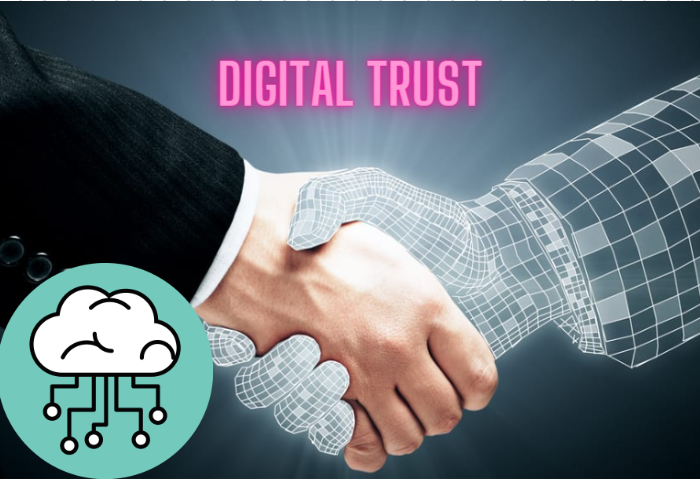Introduction
The idea of “digital trust” has evolved as a key element in determining how our interactions and experiences are shaped in today’s quickly expanding digital landscape, where technology is integral to practically every part of our lives. The importance of digital trust has reached new heights as we move through a world driven by data, algorithms, and online connections. We will delve into the nuanced facets of digital trust in this article, looking at its significance, difficulties, and possible solutions.
Table of Contents
Unpacking Digital Trust
Digital trust entails the confidence and assurance that individuals, businesses, and societies place in the security, privacy, and credibility of digital transactions, communications, and data sharing. It encompasses the belief that digital platforms, systems, and technologies can not only deliver intended outcomes but also uphold data integrity and ethical standards.
The Vital Role of Digital Trust

Driving Economic Progress and Innovation:
A healthy digital economy is built on the foundation of digital trust. It fosters innovation, supports entrepreneurial endeavors, and energizes online commerce when stakeholders have unshakeable faith in the security of online transactions and data sharing. Strong digital trust can encourage more investments and digital partnerships, which will boost economic growth.
Nurturing Customer Relationships:
Trust lies at the heart of successful customer engagements. In a climate where data breaches and cyber threats are rampant, individuals are becoming increasingly discerning about sharing personal information. Organizations that prioritize digital trust cultivate credibility, fostering enduring customer loyalty.
Facilitating Data Sharing and Collaboration:
Data sharing is essential for well-informed decision-making and productive collaboration in a connected world. However, in the absence of digital trust, people and organizations might be reluctant to share data, impeding potential collaborative projects and insights gleaned from data analysis.
Enhancing Government-Citizen Relations:
Digital platforms are being used by governments all around the world to deliver services and interact with residents. Digital trust is crucial in this situation because the public has to believe that their interactions with government technologies are private, open, and safe.
Challenges Confronting Digital Trust

Unrelenting Cybersecurity Risks:
Building confidence in the digital environment is significantly hampered by the constantly changing landscape of cyber threats. Malicious actors constantly try to take advantage of weaknesses in digital systems, putting confidential information at risk and undermining trust.
Privacy Apprehensions:
The collection and utilization of personal data have sparked concerns about individual privacy. Instances of data misuse and unauthorized access have fueled public skepticism about how organizations manage personal information.
Battle Against Misinformation and False Content:
The proliferation of fake news and misinformation online has complicated individuals’ ability to distinguish credible sources. This undermines the credibility of digital platforms and information sources, thereby eroding trust in online content.
Absence of Unified Regulations and Standards:
It can be difficult for people and companies to evaluate the reliability of online entities due to the lack of globally unified rules and standards for digital interactions.
Fostering and Sustaining Digital Trust

Transparent Communication and Accountability:
Transparency in data gathering methods, data usage procedures, and data sharing agreements should be practiced by organizations. Open lines of communication foster trust and demonstrate organizational responsibility.
Adoption of Ethical Data Practices:
It is essential to uphold user privacy and follow moral data handling principles. User expectations and legal requirements must be met when gathering and using data.
Promotion of Digital Literacy and Awareness:
Elevating awareness about digital literacy empowers individuals to make well-informed decisions concerning their online engagements. This empowerment reduces vulnerability to cyber threats and misinformation.
Collaborative Endeavors:
Governments, businesses, and individuals must collaborate to establish and uphold industry standards, regulations, and exemplary approaches that champion trust in the digital realm on a global scale.
Conclusion
In the age of digital transformation, the emergence of trust as a central element becomes evident in sustaining online interactions, transactions, and partnerships. As technology seamlessly intertwines with various aspects of our lives, the significance of trust amplifies. By confronting challenges head-on, embracing best practices, and fostering a transparent and responsible environment, we can confidently traverse the digital landscape. This proactive approach ensures that trust remains the cornerstone of our online interactions, not only enriching current digital experiences but also guiding us toward a more secure and prosperous digital future.
FAQ
What is Digital Trust?
It is the confidence in the security, privacy, and reliability of online interactions, transactions, and data exchange.
Why does Digital Trust matter?
It is the matters because it ensures safe and secure online experiences, fostering customer loyalty, enabling remote work, and driving economic growth.
How can businesses build Digital Trust?
Businesses can build Digital Trust by implementing strong cybersecurity measures, being transparent about data handling, and promoting ethical data practices.
What challenges does misinformation pose to Digital Trust?
Misinformation can erode Digital Trust by undermining the credibility of online information sources and making it difficult to discern accurate information.
How can individuals protect their Digital Trust online?
Individuals can protect their Digital Trust by practicing good cybersecurity habits, staying informed about online privacy, and critically evaluating information sources.

